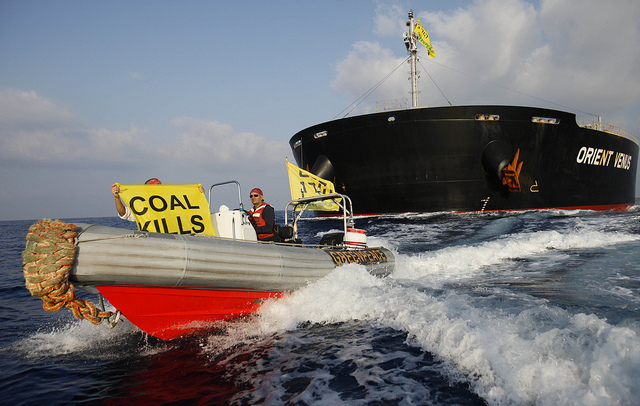
The environmental group Greenpeace launched a website called The Arctic Truth seeking to attract whistleblowers from within oil companies to reveal risks associated with drilling for oil and gas in the Arctic, with the ultimate aim of banning oil and gas firms from the fragile environment.
The Arctic Truth urges employees of oil firms and sub-contractors to submit information to the new website if they know about serious safety issues or risks that are in the public interest.
Greenpeace said that posters advertising the new website would be on show near the London offices of Royal Dutch Shell. Shell, which says it puts safety first, said in February that it would not drill in Alaska's Arctic waters this year after a 2012 season that culminated in the grounding of its drillship in a storm.
Earlier this month, in another setback for Arctic drilling, ConocoPhillips shelved plans to drill exploration wells in the Chukchi Sea off Alaska next year due to regulatory uncertainties in the United States. A retreat of Arctic ice, blamed by the U.N. panel of climate scientists on climate change, is making the region more accessible to oil and gas exploration.
Meanwhile, Thuy Ong reported for Reuters that six Greenpeace activists boarded an Australian coal ship bound for South Korea, near Australia's Great Barrier Reef last Wednesday, protesting against the expansion of the rich Australian coal industry and its impact on the World Heritage site.
Environmentalists say the Great Barrier Reef, a popular tourist site worth about $6 billion a year to the Australian economy, is threatened by dredging, sedimentation and coal port and shipping development.
UNESCO will decide in June whether the reef should be listed as a World Heritage Site in danger.
The ship MV Meister was carrying thermal coal from Abbot Point in northern Queensland state, a port that falls within the Great Barrier Reef heritage area, and was still in Australian waters in the Coral Sea when it was boarded en route to Donghae in South Korea.
"They have established a peaceful occupation of the ship," said Georgina Woods, a climate campaigner on board Greenpeace's flagship, the Rainbow Warrior.
Activists launched inflatable boats from the Rainbow Warrior and boarded the coal vessel early on Wednesday. A letter was handed to the captain of the ship detailing their reasons for the occupation. "Ordinary people will have to stand up to stop the expansion of coal exports and that's what Greenpeace is doing today," Woods said.
The Australian Coal Association, an advocacy body representing the industry, said the action was dangerous and irresponsible.
Coal is Australia's second-largest commodity, with exports increasing some 50 percent over the past 10 years and worth almost A$60 billion in 2011-2012. "We need to ensure that our sector remains internationally competitive to ensure that Australia benefits from the sustainable development of its coal resources," Nikki Williams, CEO of the Australian Coal Association, said in a statement. "The Australian people have not given Greenpeace a veto over its economic future."
Heralded as one of the seven natural wonders of the world, the 1,200 mile Great Barrier Reef is home to 400 types of coral, 240 species of birds and 1,500 species of fish.
3 WAYS TO SHOW YOUR SUPPORT
- Log in to post comments













